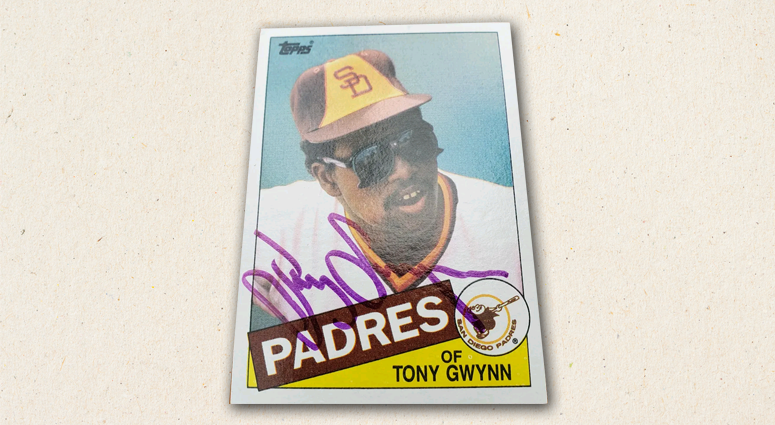
From about 2006 to 2014, I was collecting like it was my job. In fact, it partly was as I was hosting a collecting show called "The Hobby" on Saturday mornings on WGR. I also was attending card shows in the area and setting up, hoping to buy, sell and trade. I was maybe 80% collector, 20% dealer.
This challenged my organization skills. At home, I'm building sets and organizing that way, but I'd also be separating special cards from sets to display them at shows.
When we moved in 2014 and my collecting basically stopped cold turkey, cards were stacked and thrown (not literally) into boxes. That's been part of the fun of the last few weeks, as often I'll be looking through a box of something and then discover a few cards of something else.
There today, in a small pile of hockey cards, sat this autographed 1985 Tony Gwynn baseball card.
I don't know how it got there, but I know how I acquired it. I was 13 years old in 1985 and was in the habit of sending my cards to players, asking for autographs. In those days, I collected Baseball Digest, which would print the addresses for every major-league team. I'd simply send the card to that team -- "Attn: Tony Gwynn" in this case -- with a small letter about how I'm a fan who would love an autograph.
I'd send 2-3 cards per-player, if I had them. I received this card back from Gwynn that year, as well as cards from 20 or so other ballplayers.
I love this card. Of course, I have no idea if Gwynn or someone else signed it; browsing through other Gwynn signatures at least makes it seem possible that he did so himself. I love the left-handed slant of the signature, and that purple Sharpie. Not bad for 35 years old.
You can get cards like these authenticated, as experts either approve the autograph or not. But they don't know either. An authentication opens the door to more potential interested buyers, so there's value in it. Collectors will sometimes try to sell dealers their autographed cards. They'll tell you that they were to witness the autograph, that they got it personally. The dealer might believe them, or not, but what's the difference: If the dealer buys the card he'll have to tell the next customer the story. (Or the dealer can take the chance and buy the signature without the authentication. I did that on a "Joe Dimaggio ball" that turned out not to be. Whoops.)

 Mike Schopp
Mike Schopp